As part of the vibrant series of activities held by the Vietnam National University of Agriculture (VNUA) in celebration of the 2025 VNUA Flower and Ornamental Plant Festival, and to commemorate Vietnam Science and Technology Day on May 18, 2025, the Faculty of Natural Resources and Environment organized a Summary Conference on Scientific Research and Innovation on the afternoon of May 12, 2025, at the International Conference Center, VNUA. The event focused on reviewing the faculty’s scientific research and innovation efforts in 2025 and outlining an action plan to implement Resolution No. 57-NQ/TW on breakthroughs in the development of science, technology, innovation, and national digital transformation in service of the country’s sustainable development.
Attending the conference were representatives from partner businesses and companies collaborating with the Faculty of Natural Resources and Environment, VNUA, as well as sponsors supporting student scientific research and creative ideas. From VNUA, participants included VNUA’s Presidency Board, representatives from various departments and offices, the Party Committee and Faculty Management Board, faculty members, and more than 300 students, graduate students, and master's students from the faculty. This annual science and technology innovation event provided a platform for students to present their research, and to engage in academic discussions with experts and faculty members.
    |
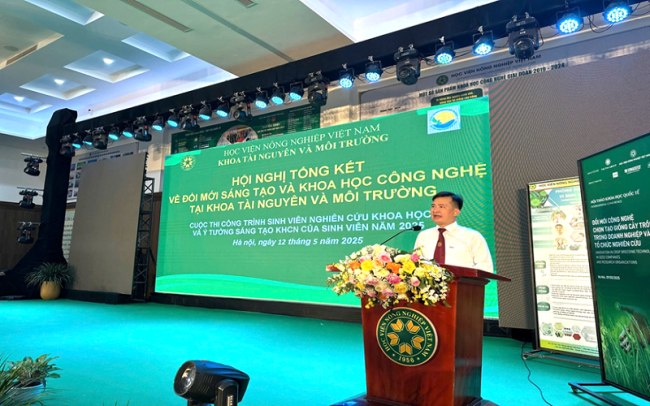 |
| Assoc. Prof. Dr. Tran Trong Phuong, Dean of the Faculty of Natural Resources and Environment, VNUA, delivers a speech at the Conference. |
In his speech at the Conference, Assoc. Prof. Dr. Tran Trong Phuong, Dean of the Faculty of Natural Resources and Environment, emphasized the Faculty's strong potential in scientific research and innovation. He noted that the Faculty currently possessed a highly qualified team of lecturers and staff with extensive experience in scientific research and technology transfer at the local level. The Faculty’s research areas were diverse, aligned with the disciplines that it managed, including land management, real estate management, natural resources and environmental management, environmental science, and soil science. Notably, in the current context, as the entire country, ministries, universities, and the Vietnam National University of Agriculture (VNUA) were actively implementing Resolution No. 57 of the Politburo, affirming that science, technology, innovation, and national digital transformation were the key drivers for fast, effective, and sustainable development. Faculty members, elite research groups, outstanding research groups, and emerging research groups in the Faculty have been actively building various plans to pursue research directions linked to innovation, digital transformation, and 3S technology (GIS, RS, GPS), with the aim to apply research outcomes to real-world contexts in agriculture, environment, and rural development.
The achievements of the Faculty were reflected not only in the number of research projects at the national, ministerial, and provincial levels; technological products; and high-quality scientific publications both domestically and internationally (within WoS/ISI/Scopus-indexed journals), but also in the widespread spirit of innovation throughout the Faculty. This spirit permeated teaching, learning, and the practical transfer of technology by lecturers, scientists, staff members, as well as graduate students, postgraduate students, and undergraduates. On average, the Faculty published 70-75 domestic scientific articles and 20-25 international articles annually in ISI and Scopus-indexed journals. Notably, in 2024, the Faculty published 89 domestic articles and 36 international publications in prestigious journals.
    |
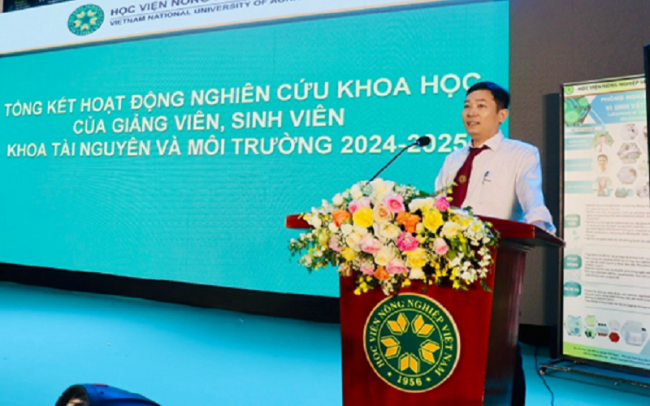 |
| Assoc. Prof. Dr. Vo Huu Công, Vice Dean of the Faculty of Natural Resources and Environment, VNUA, presents a summary report on the scientific research activities of lecturers and students of the Faculty. |
In the recent period, lecturers from the Faculty of Natural Resources and Environment, VNUA, had actively participated in bidding for and implementing a total of 48 scientific and technological research projects at various levels. These included 1 national-level project, 7 ministerial-level projects, 9 provincial-level projects, 2 IFS projects, 5 international cooperation projects, and 24 key and institutional-level projects within VNUA. In addition, the Faculty’s international collaboration activities were also rich and diverse. During the 2020-2025 period, 2 research projects and 5 international cooperation projects were signed and implemented. The Faculty's management board also invited international experts from countries such as Germany, Poland, Denmark, Japan, Ireland, Thailand, and the Philippines to present or participate in international seminars and panel discussions.
Moreover, the Faculty’s Board had been proactive in developing partnerships, signing 4 Memoranda of Understanding (MOUs) with prestigious faculties and universities around the world. These included the Faculty of Agriculture at Chiang Mai University (Thailand), the Faculty of Agriculture at Yamagata University (Japan), the Faculty of Geography at LMU Munich, and the Institute of Geography at Hildesheim University (Germany). These agreements would provide a foundation for future faculty exchange and joint scientific research over the next five years.
In the recent period, the lecturers of the Faculty of Natural Resources and Environment had actively contributed their feedback on several important legislative drafts, including the 2024 Land Law, the revised 2024 Law on Real Estate Business, the revised 2024 Housing Law, the amended Law on Water Resources, the Law on Urban and Rural Planning, and the Capital Law. These contributions had played a significant role in bringing scientific perspectives into practical policymaking. Their feedback was highly appreciated by the authorities, including the Ministry of Natural Resources and Environment (formerly), the Ministry of Construction; the National Assembly’s Committee on Science, Technology and Environment; and the National Assembly’s Council for Ethnic Affairs.
    |
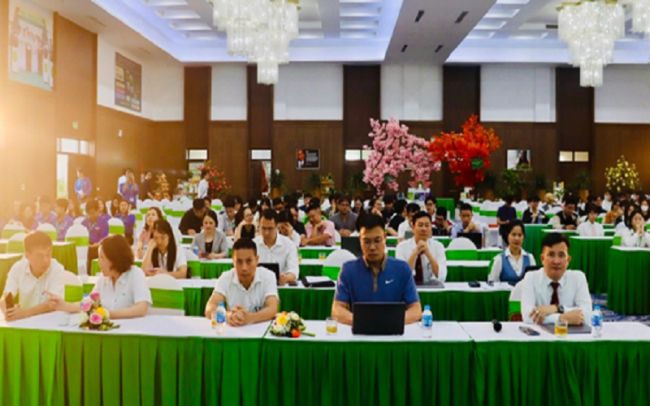 |
| Participants of the Conference |
Through the summary report on scientific research activities of the lecturers and students over the past academic year, Assoc. Prof. Dr. Vo Huu Cong provided an overview of many achievements accomplished by lecturers and students of the Faculty of Natural Resources and Environment, VNUA. As stated in the report, the faculty recorded a number of high-quality research projects at ministerial and provincial levels, as well as international collaborations that addressed urgent social issues such as climate change, circular agriculture, land-use planning, and land valuation. Student groups had also kept pace with current trends by undertaking highly applicable research topics, such as solutions for operating cadastral database systems to support digital transformation; agricultural tourism associated with local natural resource advantages; and The application of information technology and artificial intelligence in resource management, etc. Many student groups published their work in reputable national scientific journals and won awards in scientific research competitions funded by the VIFOTEC Foundation. These accomplishments affirmed the active engagement of both lecturers and students in research aligned with scientific and technological advancements, as well as their practical applicability at the local level.
    |
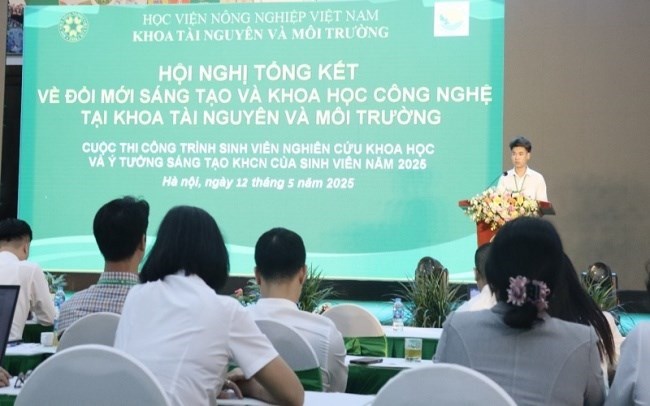 |
| Student Nguyen Van Tuyen, majoring in Environmental Science, presents his research project entitled "Medicinal Plants and the Livelihoods of the Dao Ethnic People in Hoang Su Phi District, Ha Giang Province." |
With the participation of over 300 undergraduate students, graduate students, and doctoral candidates from the Faculty, the conference served not only as a platform for spreading academic passion but also as a launchpad for innovative research ideas. This clearly demonstrated that students from the Faculty of Natural Resources and Environment, VNUA, were fully capable of adapting, innovating, and reaching national and international student scientific forums in the digital era, a time marked by the rise of the Vietnamese nation.
The conference concluded with awards given to outstanding student research groups.
The Student Scientific Research Awards were given to the following projects:
- First Prize: Assessment of Agricultural Tourism Potential Linked to Local Strengths in Bao Lac District, Cao Bang Province.
Authors: Dang Thi Le, Le Viet Hung Anh, Nguyen Van Tuyen, Tran Le Gia Bao.
- Second Prize: Assessment of Current Status and Proposal of Solutions for Operating a Land Database System to Serve Digital Transformation in Uong Bi City, Quang Ninh Province.
Authors: Do Hai Ngan, Bui Diem Quynh, Vu Tuan Anh, Lam Van Quang, Vu Trong Nhat.
- Second Prize: Medicinal Plants and Livelihoods of the Dao Ethnic Community in Hoang Su Phi District, Ha Giang Province.
Authors: Nguyen Van Tuyen, Le Viet Hung Anh, Tran Le Gia Bao, Nguyen Thuy Quynh, Pham Chau Anh.
- Third Prize: Impacts of Urban Heat Island Phenomenon on Public Health in Hanoi City.
Authors: Tran Quang Vinh, Bui Bich Hong, Nguyen Trung Hieu, Nguyen Thu Duyen, Luu Thi Hoang Thao.
    |
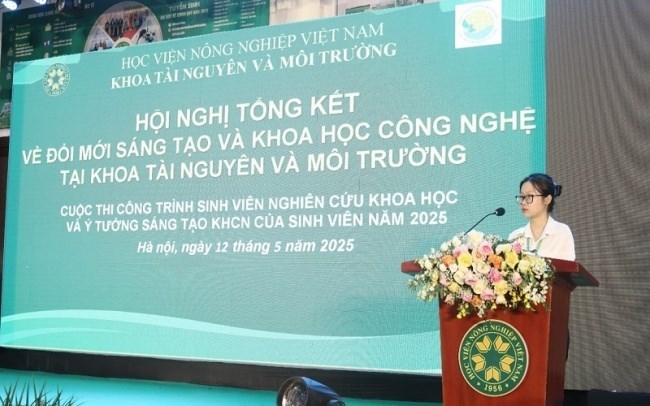 |
| A student presents a scientific and technological innovation idea in 2025. |
Student Scientific and Technological Innovation Idea Awards were given to the following outstanding projects:
- First Prize: Assessment of mangrove forest resources and carbon sequestration potential in Thai Thuy District, Thai Binh Province.
Author: Phạm Thị Châu Anh
- Second Prize:
- Laboratory-scale research on producing biochar from crop residues.
Author: Vu Ngoc Ha Chi
- Application of GIS to develop soil pollution warning maps in the Minh Khai plastic recycling craft village, Hung Yen Province.
Authors: Le Van Quyet, Vu Thanh Tung, Do Ngoc Huyen Trang
- Third Prize:
- Assessment of forest status changes using NDVI (Normalized Difference Vegetation Index) and proposals for forest protection in Soc Son District, Hanoi.
Authors: Tran Quang Vinh, Bui Bich Hong, Nguyen Trung Hieu, Nguyen Thu Duyen, Luu Thi Hoang Thao
- Application of remote sensing and AI in land and resource management in Hai Duong City.
Authors: Luong Thanh Trang, Vu Thi Huyen Dieu, Le Thanh Duong, Nguyen Ba Muoi, Le Ngoc Dung
- Application of Artificial Intelligence (AI) and Geographic Information Systems (GIS) in forecasting and mapping air quality warnings in Gia Lam District, Hanoi.
Authors: Nguyen Gia Hai, Nguyen Phuong Anh, Le Danh Dat, Pham Hoang Giang, Huynh Thanh Hang
- Consolation Prizes:
- Study on operating cadastral database systems to support digital transformation in the natural resources and environment sector in Tay Ho District, Hanoi.
Authors: Tran Hoang Phuong Nhi, Nguyen Dang Khoi, Truong Tan Dung, Nguyen Trung Hieu, Vu Trong Nhat
- Assessment of the impact of land acquisition for industrial zone development on local people’s social well-being in Xuan Truc Commune, An Thi District, Hung Yen Province.
Authors: Bui Ngoc Nghia, Tran Anh Quan
- Idea for desalination – turning seawater into fresh water.
Author: Dam Trung Hieu
    |
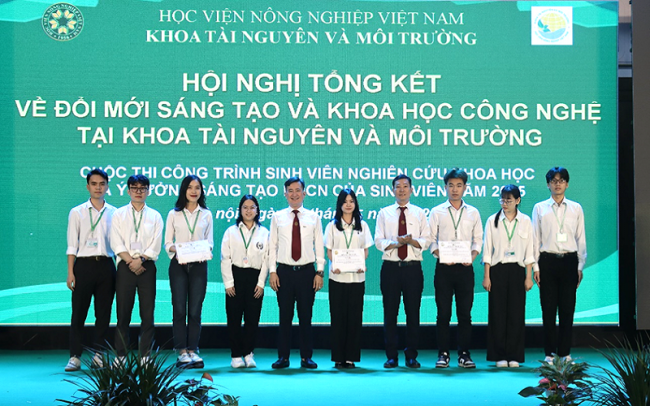 |
| Assoc. Prof. Dr. Tran Trong Phuong gives awards to the student groups winning the Student Scientific Research Project Awards. |
    |
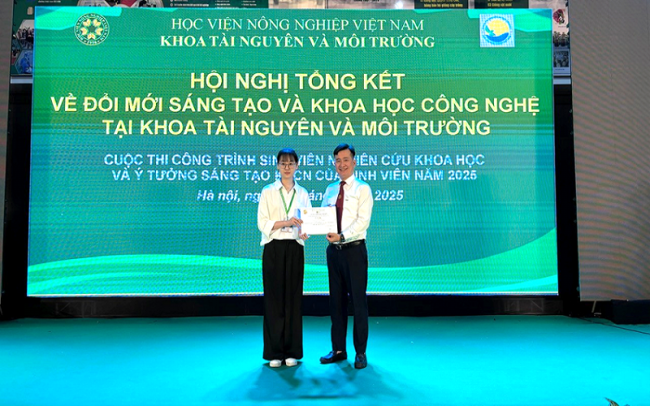 |
| Assoc. Prof. Dr. Tran Trong Phuong awards the First Prize for Student Scientific and Technological Innovation Idea to Student Pham Chau Anh. |
Scientific research activities among students of the Faculty of Natural Resources and Environment, VNUA, had been making positive strides, as reflected by the increasing number of research projects, the improved quality of research, and the clear applicability of outcomes in practice. These achievements not only helped students develop scientific thinking and research skills but also affirmed the university’s role in training high-quality human resources to meet the demands of sustainable development in the fields of natural resources, environment, and climate change.
However, to further enhance the effectiveness of student research activities, greater attention is needed from the university, specialized faculties, and supporting research units. It is also essential to build a dynamic academic environment that fosters innovation and strengthens the connection between research and real-world application. This will lay a solid foundation for students to develop comprehensively in both professional knowledge and practical skills in this era of global integration.